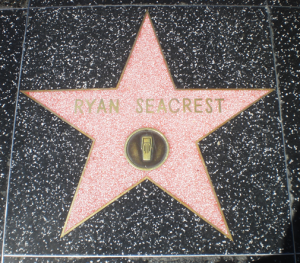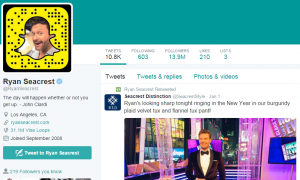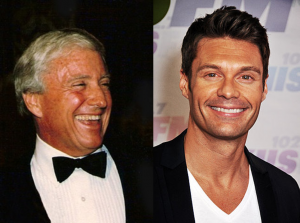 Last month, the New York Times profiled perhaps the most successful disc jockey in the world, Ryan Seacrest. It’s actually a misnomer to use the “DJ” moniker to describe Seacrest because he has used the radio studio as a jumping off point to build a truly awesome multi-media brand. And yet, he hasn’t forgotten his roots.
Last month, the New York Times profiled perhaps the most successful disc jockey in the world, Ryan Seacrest. It’s actually a misnomer to use the “DJ” moniker to describe Seacrest because he has used the radio studio as a jumping off point to build a truly awesome multi-media brand. And yet, he hasn’t forgotten his roots.
On social media last week, some described Seacrest and his co-stars on Rockin’ New Year’s Eve as lame or even cringeworthy. Others openly question whether the guy has talent, and specifically, what are his skills. Some of you may have even thought while watching or listening to Seacrest that you have as much, if not more, talent than he does.
So how did he get to this point where there’s no other personality in radio who can come even remotely close to his level of success?
In the New York Times piece, written by Guy Trebay, Larry King suggests it’s not Seacrest’s humor or even his voice. But as the article notes, he makes just about any media job look easy – and most of you reading this blog know how hard that truly is to pull off. The guy is simply smooth, skilled, and charming.
Digging a bit deeper into this Seacrest profile turns into primer about how today’s radio personalities might rethink their approaches, and frankly think more like Seacrest. Because whether you like him or not, Ryan Seacrest has accomplished what few radio personalities have been able to pull off. With apologies to Howard Stern, he may have become the new “King of All Media.”
There’s always a lot of talk at Don Anthony’s “Morning Show Boot Camp” (ironically this year in Seacrest’s hometown of Atlanta) about building personality brands. The Times article on Ryan Seacrest is a step by step game plan for building wealth, power, and security in the media and entertainment business. And like many of you, it all started in a radio studio.
Here’s how he’s done it – along with the key steps that any DJ could put into action:
1. Everything for a reason – The money quote in the article is obvious:
“I don’t believe I’ve ever done anything on camera or on the microphone without thinking of the back house opportunities and the next business play.”
If you think about it, that’s how Seacrest – as well as personalities like Glenn Beck, Howard Stern, Rush Limbaugh, and Dave Ramsey – has approached his craft. There’s a reason for everything and a purpose to each task, opportunity, appearance, and connection.
Thinking through “What’s next?” and what it can mean down the road is truly Seacrest’s formula behind building his brand. The great news is that any DJ, show, or host in Anytown, USA, can use this same approach. Whether you’re a charity spokesperson, making a speech to a high school class, or doing a car dealer remote, there is the potential for these activities and the relationships they nurture to have future payoffs. But you have to think them through, and see them for more than a series of one-off events and activities. 
2. Overcome your insecurities – One of the little-known secrets about Ryan Seacrest is that he was admittedly overweight as a kid, creating a feeling of discomfort while growing up. I have yet to meet a radio personality who doesn’t have insecurities of their own – emotional baggage that can haunt a career and even take it down.
Seacrest overcame his adolescent issues, and made himself into the cool guy; someone who truly has become a celebrity to be reckoned with. None of this happens by accident, and it requires meeting insecurities and doubts head-on – and vanquishing them.
For radio DJs, overcoming those demons can be the difference between a career filled with frustration, anger, and angst, or beating it all back and excelling in areas that were once roadblocks.
3. Take on any job – During his storied career, Ryan Seacrest has pretty much hosted anything and everything. From kiddie TV shows to reality TV to trivia contests, he’s done it all.
When you’ve been the front man on everything from ESPN’s Radical Outdoor Challenge to Gladiators 2000 to Wild Animal Games, you earn your chops, build up exposure, and make industry contacts that lead to opportunities like American Idol and New Year’s Rockin’ Eve. One thing indeed leads to another, but it begins with saying “yes” to every exposure opportunity. For local air personalities, that “can do” attitude is a big separator between you and everyone else.
4. Work your ass off – From his syndicated radio show to American Idol to various roles on E! to the 2016 Olympics in Rio, Seacrest has taken a tireless approach to building his brand. You may not know that he’s the producer of Keeping Up With the Kardashians, along with a variety of other reality TV shows.
You don’t get to become a Seacrestian brand without a legendary work ethic. In the Times article, Jennifer Lopez sees Seacrest quips, “Ryan and I often joke with each other who has had the least amount of sleep or number of days off.”
There is no substitute for simply outworking the competition. And when you’re driven to building a celebrity media brand – you’ll do it all. By taking a secondary role in NBC’s 2012 Olympics coverage in London, Seacrest got rewarded with an expanded role in this year’s Rio games. Everything happens for a reason, but it starts with a Herculean attitude toward doing your job – and lots of other jobs.
5. Work the community – It’s all about local connections, even if you’re a global star like Seacrest has become. His local Hollywood community is an important one, because it’s the base of his connections and power.
Seacrest now sits on the board of the Los Angeles County Museum of  Art, whose trustees include some of the biggest names in the community – from Pritzker to Grazer to Tisch.
Art, whose trustees include some of the biggest names in the community – from Pritzker to Grazer to Tisch.
Seacrest also keeps close to Atlanta. His Ryan Seacrest Foundation has two centers – one in Atlanta and the other in Philadelphia.
On the local level, this is a critical piece for radio personalities who seek to be positive forces in their hometown communities, while leveraging this activity to create even deeper roots and connections.
6. Learn the social media ropes – There are few successful mega-celebrities at any level of the entertainment industry who have ignored or “mailed in” Facebook, Twitter, Instagram, and other key social channels. On Twitter, Seacrest is nearing 14 million followers, while over on Instagram, he’s well above the 2 million mark.
Recognition of the need to interact socially and to show your fans your life and your personality is something Seacrest grasps. Many radio personalities continue to struggle with social media, missing out on the chance to reveal their different sides in ways that just don’t translate on the air. The chance to thank and acknowledge others – staffers, audience members, fans, cops, service workers – is what social interaction is all about. Yes, it takes time. But it also requires thought, kindness, and caring – and you can see this regularly in Seacrest’s social messaging. 
7. Don’t forget where you came from – I’ve heard people in radio wonder why Seacrest is still on the air. After all, his television and other global media activities have superseded his radio show.
But On Air With Ryan Seacrest is heard on 126 U.S. markets, along with 50 international cities. That radio reach is powerful, allowing Seacrest the chance to intimately connect with millions and millions of listeners in ways he cannot on American Idol or on any number of red carpets. Plus, to be the morning guy on KIIS-FM in L.A. is a key component of what Seacrest is all about, not to mention he’s the morning guy in the world’s biggest entertainment market.
Seacrest got his start on WSTR in Atlanta, and continues to make radio a key component of his empire. This is a reminder to every personality in radio about the power of the medium, and its unique importance in the communications world. The Times estimates that Seacrest is worth hundreds of millions of dollars. And like many of you, he wakes up early, sits behind the mic, and talks to a hunk of glass.
8. Choose a great mentor – In Seacrest’s case, it’s Merv Griffin, who some of you may remember was sort of the Ryan Seacrest o f his day. Starting as a big band singer, Griffin became a TV talk show host who then created hit game shows (Jeopardy and Wheel of Fortune), which led to a legacy worth nearly a billion dollars when he passed away nearly a decade ago.
f his day. Starting as a big band singer, Griffin became a TV talk show host who then created hit game shows (Jeopardy and Wheel of Fortune), which led to a legacy worth nearly a billion dollars when he passed away nearly a decade ago.
As Seacrest told the Times, “What crystalized for me when I sat with Merv in a meeting was seeing everything I did as a course in the class of what to do next.”
For radio personalities, the value of having a mentor is a key to seeing and shaping your future. Who do you admire in the business? Who has accomplished the things you dream of? Can you establish a relationship with that person, or even learn the ropes from afar?
9. Plan for what’s next – In so many of these earlier steps, a key to Ryan Seacrest’s ascend to success has been looking down the road, making a plan, and staying with it. Using radio and then TV as a launching pad, he has been able to create other enterprises that leverage his core abilities.
He told the Times that “Show business is what drives the other businesses.” And for Seacrest, that means a line of men’s clothing available at Macy’s stores – Ryan Seacrest Distinction. In this area of brand extension, there is obviously much more to come. And that should signal opportunity for radio’s personality shows big and small.
The chance to grow a DJ francise with merchandizing and other branded products has never been greater. Thinking beyond the microphone into other interests that make sense (John Boy & Billy, for example, have marketed their own “Grillin’ Sauce” line), is all part of the residuals that come with building a great personality brand.
10. Don’t rest on your laurels – When you’ve got big ratings, there’s a tendency to kick back and enjoy the moment. It is notable that as American Idol rapidly became the megawatt hit of this new century, Seacrest used its success to create a runway “to build annuities that would outlast the show.”
In showbiz, as in life, nothing lasts forever, ratings come down, and the public moves on to the next big thing. When Idol finally goes off the air, the one person with nothing to worry about will be Ryan Seacrest.
Planning for any eventuality is exactly how local radio personalities can ensure there’s life beyond their station or their show. As we well know, stations get sold, consolidation happens, and not everything is in your control. Using a hit show to help establish additional business and branding opportunities is just smart. Jeffrey Katzenberg describes Ryan Seacrest as a “natural learner,” and that’s a quality that is so essential to building and maintaining a strong presence and a successful franchise.
So many showbiz rises and falls are attributable to talent that failed to keep up with the changes.
Ryan Seacrest is not that guy.
- Is It Quittin’ Time For SiriusXM? - November 26, 2024
- Radio, It Oughta Be A Crime - November 25, 2024
- Baby, Please Don’t Go - November 22, 2024




I remember Ryan’s early days in L.A. radio and he was brilliant at self promotion from the get go. Yet strangely, it didn’t come across as irritating.
That’s the charm! Thanks for commenting, Ira.
Fred!
Thank you again! This is so good. We had an after show meeting today where we hit on a few of these items. I am emailing everybody on out show (Lex and Terry) this article right now. If they don’t read it …. shame on them!
Terry
Thanks so much, Terry. You made my day. Best to you and Lex.
Seacrest is a presenter who has always been smooth and very calculating like Dick Clark was. Dick Clark essentially was a bore, and not a charismatic talent. But neither Clark or Seacrest let that stop them. Both have great clean cut All American appearances, can speak English in a manner that is understandable, unflappable determination and business savvy. He’s a seamless presenter, let’s be honest most radio talent doesn’t have the social, or emotional intelligence to pull this off. Often times talent has odd looks, odors, lack of education, lack of couth and most importantly very little ability to be themselves in a manner that transcends a radio show. The anti-social types, slovenly, and edgy folks just aren’t ready for prime time. Most of his skills are not transferable. Merv Griffin had a lot of power and took a young Seacrest under his wings. I’ll leave it at that. Is he a tremendously talented jock’s jock? Never. But that isn’t what people expect from him. He’s a celebrity, celebrated for being bland and inoffensive. For that he’s a genius.
Bob, thanks for the observations and for adding to the conversation. Talent is impossible to quantify, and that’s what always makes it so damn interesting to talk about.
He’s ultimately safe. If your daughter brought him home and said he was her new boyfriend, you’d likely breathe a sigh of relief. Kinda like Carson Daly on MTV back in the day. Dreamy (maybe), non-offensive, safe; someone you could leave your kid alone with and not worry. And who is Seacrest’s direct competition for AM drive in LA radio? Um…didn’t I mention him already?
Ryan Seacrest is yin, Charlie Sheen is yang.
I’d prefer not to hang out with either of them, but that’s just me.
Ryan Seacrest has many endearing qualities, and you name several of them. It’s fascinating how it is so hard for all of us to describe what contributes to magnetism, charisma, and all-out appeal. As for Charlie Sheen…
Thanks for this! I was emailed this from our GM describing what the great one do and do not do and how to aspire to this on our own for OUR vision of what we do. This prompted me to reach out to my mentor, Spike O’Dell. He is who I listened to growing up in the Quad Cities when he was a medium market, Top 40 AM jock. He went on to greatness at WGN and legendary status until he retired several years ago. I reached out to him to see if he was interested in imparting some wisdom to me. I do my show (PM drive)as he used to do his. Light, fun, interesting, not taking anything too seriously as life had enough of that on it’s own. My listeners seem to enjoy that and I thank them and Spike for it. Really appreciate this article! It was an eye opener and thought provoker.
It’s always nice to hear feedback like this, Shawn. I’m glad the post was inspirational to you and I appreciate you sharing it with me and JacoBLOG readers. Best of luck!
Inspirational thank you. ..
My pleasure.
Fred, Watching Ryan as an intern in Atlanta, you could see the spark and work ethic of a star in the making. His meteoric rise into a mega talent is rooted in a key trait – he shifts the spotlight from himself to his guest; allowing them to feel like the star of the moment. This commitment reminded me of a life lesson offered by John Leader @ WQXI-AM. I had just been hired by Scott Shannon to develop WQXI-FM (when last we spoke he still called me “college boy”…) My first remote appearance had been announced at a staff meeting. Later, John asked that I join him in the AM studio – yes, I was shaking with excitement and a bit scared. He paused, looked me straight in the eye and said: “Remember this always – the 50th person you meet today gets the same smile, eye contact and attention as the first.” His words became the essence of my career successes. Today, I’m blessed with client relationships that span two and three decades. Ryan isn’t bland or vanilla as critics might label. He’s using his status to facilitate an unforgettable moment for someone by giving them time in the spotlight.
There’s an art to making others look good, and in the process, you get the glow. Thanks for sharing the perspective and the life lessons, Jim.
What a FANTASTIC piece! Sharing it with my staff now.
Much appreciated, R Dub!
I love this guy he made me who i am am a radio presenter and i have my blog now http://www.godmuya.com and still studying but he is the one did inspired me to com this far..
Merv Griffin was a singer the calibur of which could have easily been a recording artist competing head to head with his contemporaries , Dean Martin , Rosemary Clooney and all the rest ; he had many skills including entrepreneurial and wealth far beyond somebody like Ryan Seacrest. To compare Mr Griffin to a camera whore who is 5 Ft 6 , unattractive , doesn’t sing , doesn’t act and doesn’t dance is a travesty.
Tom, first of all, thanks for responding. You may not realize this post is 5+ years old. Nonetheless, I wrote what I wrote. I described Merv as “a great mentor” of Ryan’s. I never suggested Ryan was on Merv’s level. In fact, I went back to the post to read the “travesty.” I described Merv Griffin as follows:
“…Merv Griffin, who some of you may remember was sort of the Ryan Seacrest of his day. Starting as a big band singer, Griffin became a TV talk show host who then created hit game shows (Jeopardy and Wheel of Fortune), which led to a legacy worth nearly a billion dollars when he passed away nearly a decade ago.”
I’m comfortable with what I wrote. It is respectful and factual. Thanks for your comment.